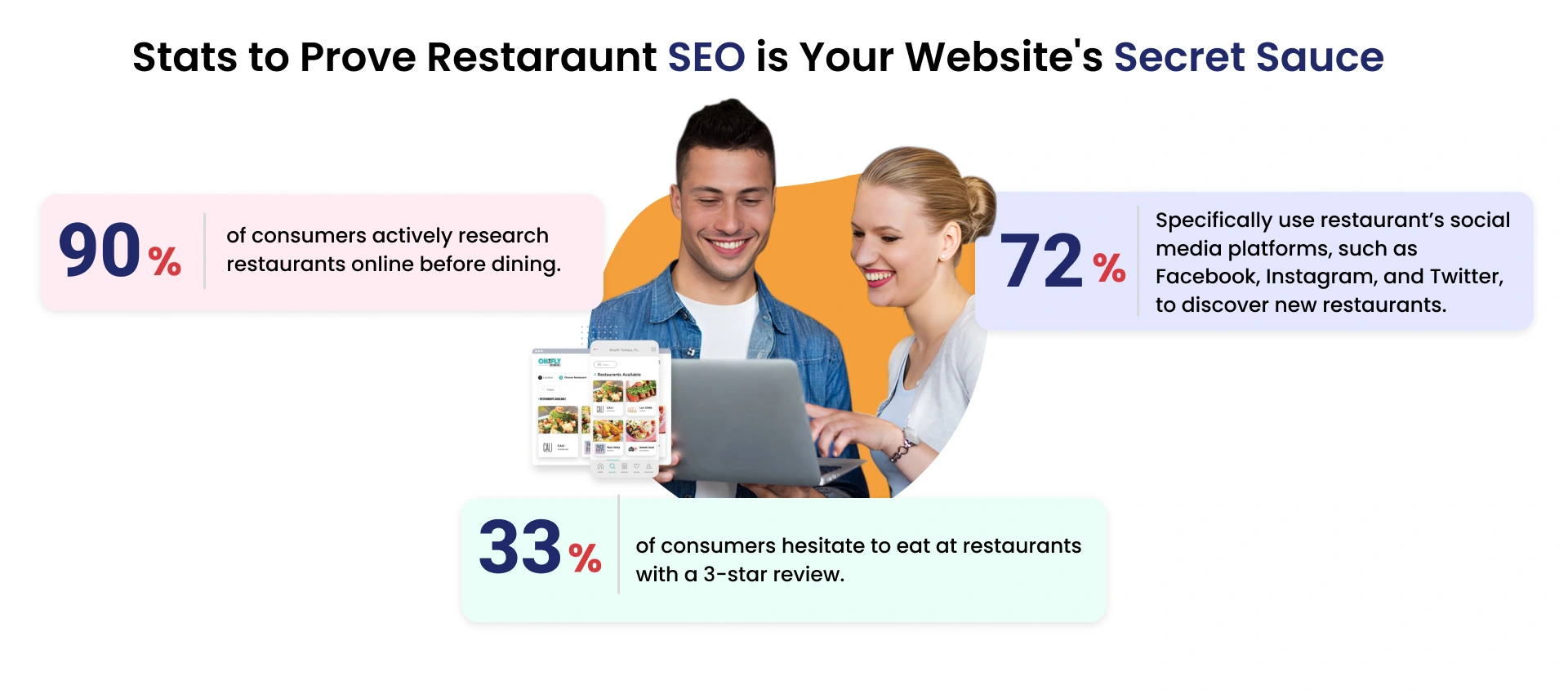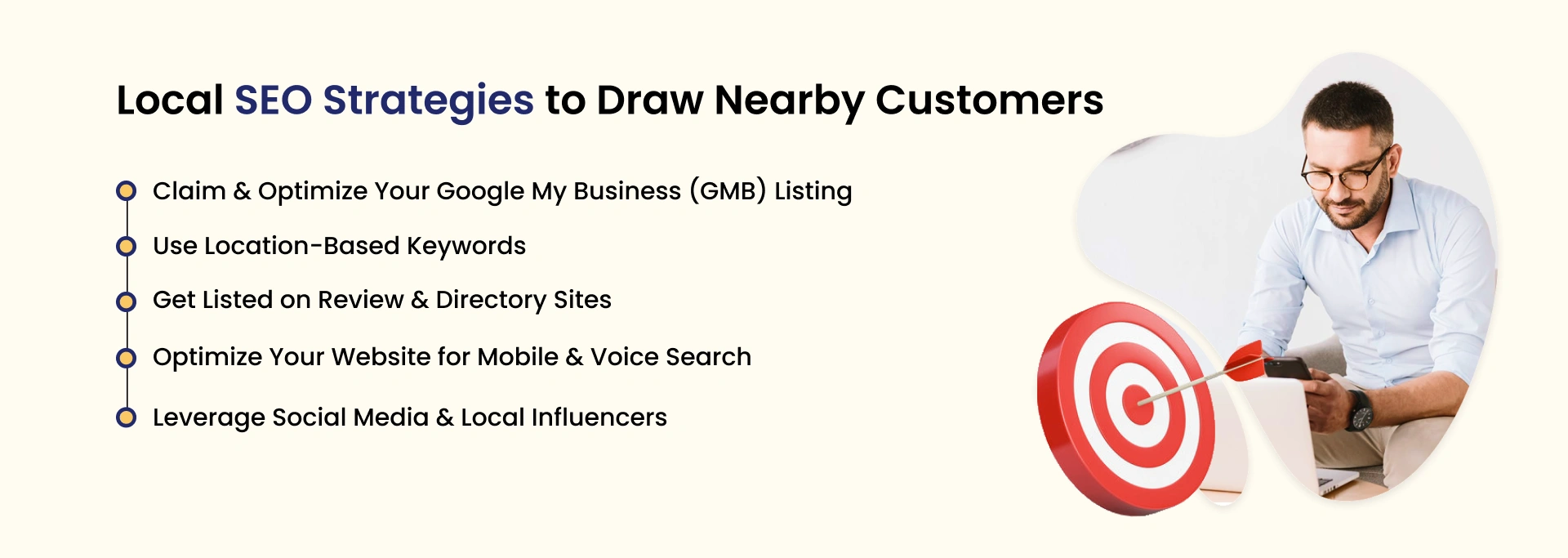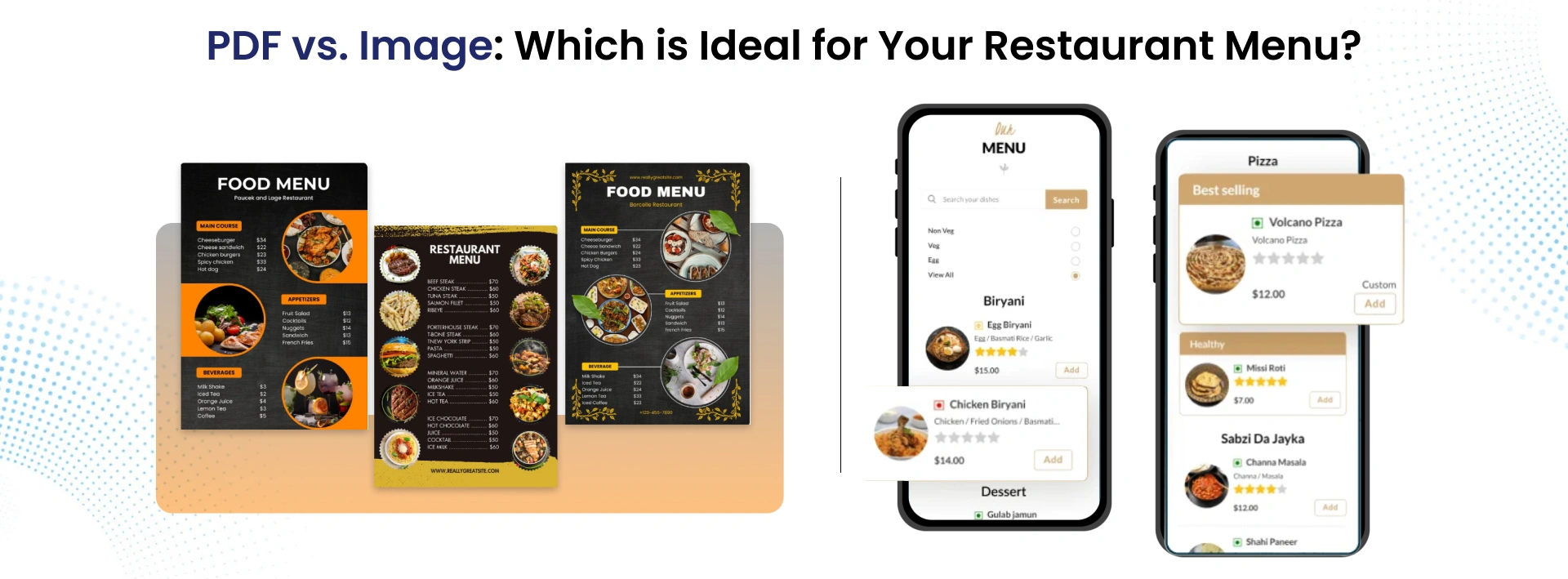A group of friends craves pizza and searches for the best pizzeria near them. They pull out their phone and type “best pizza place in Tysons" (or any other location they’re in), and Google shows them a list of options within seconds. But your restaurant isn’t on that list, even though your pizza is hands-down the best in town. Instead, they choose a competitor, and just like that, you’ve lost potential customers without even realizing it.
This happens daily to restaurants that don’t optimize their online presence. In a world where 90% of diners research a restaurant online before visiting, SEO for restaurants is no longer optional, it’s the secret ingredient to getting more foot traffic, more reservations, and more online orders.
- When choosing a restaurant, 90% of consumers do online research first. [source]
- Facebook, Instagram, and Twitter are key for 72% of consumers to find restaurants. [source]
- According to findings from our survey on restaurant star ratings, 33% of restaurant-goers would not eat at a restaurant with an average 3-star review on sites like Yelp, Google, and Facebook. [source]

By mastering restaurant search engine optimization, you can ensure your business shows up at the top when hungry customers search for a place to eat. From local SEO for restaurants to help diners in your area find you to website optimization that speeds up your site and makes it mobile-friendly, the right SEO strategy can be the difference between a whole house and an empty dining room.
The problem? Many restaurant owners unknowingly make SEO mistakes that bury them in search results. These mistakes don’t just cost you traffic, they cost you real customers and actual revenue. But here’s the good news: You can fix them!
In this blog, we’ll discuss the most prominent SEO mistakes restaurants make and how to fix them quickly so you can start getting more customers today. Let's dive in if you're ready to fill more tables, increase online orders, and finally beat the competition!
What is SEO for a Restaurant Website?
SEO or Search Engine Optimization is the key to making your restaurant get noticed and drive organic traffic without paying for ads. With restaurant search engine optimization, you optimize your Restaurant website, content, and listings so your business appears at the top when people search for restaurants to eat. SEO for restaurants plays a big part in this, which ensures that when someone looks for "best burger near me" or "top seafood in Virginia," your restaurant shows up.
Focusing on restaurant SEO can help you optimize your Google My Business profile, get listed on reviews like Yelp and TripAdvisor, and use the right keywords to attract local customers. SEO also enhances your website’s speed and user experience, keeping visitors engaged and encouraging them to take action. When done right, SEO drives organic traffic to your restaurant’s site, increases reservations, and ultimately brings more customers through your doors.
Before you decide, ask yourself if your restaurant needs SEO to increase orders. Whether business is booming or you’re looking to grow, SEO is not something you can afford to ignore. It’s an ongoing strategy that drives traffic to your restaurant’s website and gets more diners through your doors.
Why is SEO Key to Success for Your Restaurant?
When people look for the perfect restaurant, they turn to Google. If your restaurant isn't showing up in those search results, you're missing a golden opportunity to grab their attention! This is where SEO for restaurants steps in to help you shine and get noticed by those hungry customers who are googling the restaurant in your City. By optimizing your restaurant website and online presence, restaurant search engine optimization helps you rank higher, so you get noticed when hungry customers are searching for their next meal.
People aren’t just searching for any restaurant; they’re looking for one nearby. So when someone Googles “best sushi near me” or “top Italian restaurant in New York,” you want your restaurant to pop up immediately. SEO ensures you’re in the spotlight and ready to welcome those hungry guests!
Proven Key SEO Strategies for Your Restaurant Website!
To stand out in the competitive food industry, your restaurant needs a strong online presence. These proven SEO strategies will help you attract more customers and rank higher in local searches.
1. Why Keyword Research & Optimization is important
Imagine this: a hungry person is searching online for the best dining spots nearby, but if your restaurant isn’t using the right SEO tactics, they might never find you. You're likely missing out if you haven’t started focusing on SEO for restaurants yet. By targeting keywords like "best restaurants near me," "top restaurants in Virginia," or "best burger in New York," you can improve your chances of ranking higher in search results without spending on ads. This means more organic traffic, reservations, and customers walking through your doors. If you haven’t optimized yet, now’s the time to get started, this could be your secret weapon to growing your restaurant business!
A. Why is Keyword Research Essential?
Keyword research is crucial for boosting online visibility, attracting customers, and staying competitive. It helps search engines match users with relevant businesses, enhancing your chances of success. Here’s why it’s important:

- Better Search Rankings: When your restaurant’s website is optimized for search engines, you’ll show up in search results when potential customers are looking for dining options in your area. For example, if someone types “best pizza near me” or “restaurants in [your city],” search engines like Google will prioritize businesses that have done proper SEO. This increases the chances of your restaurant appearing at the top, increasing visibility.
- More Local Customers: Local SEO for restaurants focuses on optimizing your business for searches within your area. Using targeted keywords like "restaurants near me" or "[your city] dining spots" helps ensure you're reaching people who live or are nearby and are actively searching for a place to eat. In their local searches, you’ll attract customers ready to dine out or order in, boosting foot traffic and delivery orders.
- Higher Conversion Rates: Optimized content doesn’t just attract visitors; it helps turn them into customers. By providing clear, easy-to-find information about your menu, hours, location, and reservations, you make it easier for people to take action. Whether making a reservation online or placing a takeout order, well-optimized content encourages customers to follow through—leading to higher conversion rates.
- Outshine the Competition: If your competitors use SEO strategies to appear in searches and you’re not, you're letting them steal potential customers. SEO for restaurants helps you stay competitive by ensuring you don’t miss out on valuable traffic. The more visible you are, the more likely you’ll attract diners over your competitors who haven’t focused on their SEO efforts.
2. Local SEO for Restaurants to attract nearby customers
Struggling to get more diners through your restaurant doors? The secret isn’t just in your recipes; it’s in restaurant search engine optimization (SEO)! When people crave a great meal, they turn to Google first, and as per Google search results, they prefer to reserve a table at the restaurants. By fine-tuning your Google My Business listing, you ensure the customer can find you instead of your competitor's restaurant on the Google search list. A well-optimized Google profile helps your restaurant stand out, rank higher in searches, bring more hungry customers to your tables, and help you generate the revenue your restaurant dreams of.
A. How to Optimize for Local SEO
Want more Local customers? Local SEO helps your restaurant rank higher in searches, bringing more diners to your tables. Optimize your Google My Business (GMB) listing, use location-based keywords, and encourage positive reviews to boost visibility. Here’s how to do it:

- Claim & Optimize Your Google My Business (GMB) Listing: Ensure your restaurant’s name, address, and phone number (NAP) are always current. Add high-quality photos showcasing your food and ambiance, and encourage happy customers to leave positive reviews to improve your visibility.
- Use Location-Based Keywords: Target keywords like “best Chinese restaurant in New York,” or “Top diner restaurant near me.” Include these in your website content, meta descriptions, and blog posts to help your restaurant rank higher in local searches.
- Get Listed on Review & Directory Sites: Ensure your restaurant is listed on popular review and directory sites like Yelp, TripAdvisor, and OpenTable. Respond to reviews to engage with your customers, build trust, and increase your restaurant’s credibility.
- Optimize Your Website for Mobile & Voice Search: Since most local searches happen on mobile devices, make sure your website is fast, mobile-friendly, and easy to navigate. Use natural, conversational keywords (e.g., “Where’s the best brunch in Ashburn?”) to capture more search traffic for voice search.
- Leverage Social Media & Local Influencers: Connect with local customers through social platforms like Instagram, Facebook, and TikTok. Collaborate with local food bloggers and influencers to increase your restaurant’s visibility and reach new audiences.
3. Easy Navigation & Fast Loading website
Your website often gives potential customers the first impression of your restaurant. If it’s slow or hard to navigate, they’ll leave and probably go to your competitor instead! That’s why having a fast-loading and easy-to-navigate website is crucial for restaurant SEO and overall user experience.
A. Why Its important
- Faster Sites Rank Higher: Google prioritizes websites that load in under 3 seconds, boosting their visibility.
- Better User Experience: A clean, well-organized website keeps visitors engaged and increases their likelihood of booking a table or ordering.
- More Conversions: Easy navigation ensures customers can quickly find your menu, location, and ordering options, increasing sales.
- Lower Bounce Rates: Slow or confusing websites drive visitors away, negatively impacting rankings.
B. How to Improve Website Speed & Navigation
- Optimize Images: Compress large images of your food to speed up load times without sacrificing quality.
- Use a Clean, Mobile-Friendly Desig: Ensure your website adapts seamlessly across all devices for a smooth user experience.
- Streamline Navigation: Keep your menu simple with clear sections like "Menu," "Reservations," and "Contact" to guide users effortlessly.
- Reduce Unnecessary Plugins & Code: Too many plugins and excessive code can slow down your site, so only keep what’s essential.
- Use a Fast Hosting Provider: A reliable hosting provider ensures your website loads quickly and performs smoothly.
- Enable Browser Caching: This allows returning visitors to load your site faster, improving their experience.

4. Content Marketing
If you want to go beyond basic SEO and drive more organic traffic, content marketing, and blogging are your best friends! Creating valuable and engaging content can improve your restaurant's Google ranking, build customer trust, and increase reservations.
- Boosts SEO Rankings: Regularly updated blog content with targeted keywords like "Japanese restaurant Ashburn" and "Wing Restaurant Near Me" helps Google rank your website higher.
- Drives Organic Traffic: Blog posts about trending food topics, dining tips, or food recommendations attract visitors looking for inspiration, recipes, or restaurant experiences.
- Establishes Authority: Sharing behind-the-scenes stories, chef interviews, and insights into your unique menu items positions your restaurant as an authority in the food industry.
- Engages Local Customers: Writing about local food events or creating content like “Best Restaurants in Hampton” helps you rank for local SEO searches and connect with customers nearby.
- Encourages Social Sharing: Engaging blog posts will likely be shared across social media platforms, bringing in more potential diners who discover your restaurant through their networks.
A. Content Ideas for Restaurant Blogs
- Food & Menu Highlights: Write about seasonal specials and new dishes, or explore the story behind your signature dish to capture the attention of food lovers.
- Local Food Guides: Create blog posts like “Top 10 Brunch Spots in Norfolk” or “Best Date Night Restaurants in Richmond” to attract local searchers looking for dining recommendations.
- Event Announcements: Promote upcoming events like happy hours, live music nights, or exclusive specials to keep customers in the loop and encourage bookings.
- Chef’s Tips & Recipes: Share behind-the-scenes cooking tips or exclusive recipes to engage your audience and build a deeper connection with food enthusiasts.
- Customer Stories & Reviews: Feature testimonials and stories from satisfied guests to build trust and show potential customers what makes your restaurant unique.
5. Technical SEO
Technical SEO focuses on optimizing a website’s structure to improve search engine crawling, indexing, and ranking. It ensures fast loading, mobile-friendliness, and security, helping boost visibility and user experience.
A. Why Technical SEO is Important for Restaurants
While great content and the right keywords bring visitors to your website, Technical SEO ensures that your restaurant’s site is fast, mobile-friendly, and optimized for search engines. Even the most compelling content might struggle to rank without proper technical SEO!
- Improves Website Speed: A fast-loading website keeps visitors engaged and reduces bounce rates, ensuring more customers stay on your site longer.
- Enhances Mobile Experience: With most restaurant searches happening on mobile devices, your site must be mobile-friendly and easy to navigate.
- Boosts Google Rankings: Search engines prefer well-optimized and technically structured websites, so technical SEO is essential for improving your search rankings.
- Helps Search Engines Understand Your Site: A technically sound website helps search engines like Google understand and index your pages correctly, boosting your visibility.
B. Essential Technical SEO Tips for Restaurants
- Optimize Page Speed: Use tools like Google PageSpeed Insights to assess and improve your site’s loading speed. Compress images, enable caching, and choose a fast hosting provider to speed things up.
- Ensure Mobile-Friendliness: Your site must be responsive, adjusting seamlessly to all screen sizes. Use Google’s Mobile-Friendly Test to check your site’s mobile optimization.
- Fix Broken Links & Errors: Regularly check for 404 errors or broken links that could harm your restaurant website’s performance and user experience.
- Implement Structured Data (Schema Markup): Use Restaurant Schema to highlight essential details like operating hours, location, menu, and reviews so that Google can display them directly in search results.
- Enable HTTPS (SSL Certificate): A secure website builds customer trust and ensures better search engine rankings.
- Optimize XML Sitemap & Robots.txt: Optimize your XML sitemap and Robots.txt file to ensure search engines can easily crawl and index your important pages.
- Improve Internal Linking: Use internal links to connect your key pages (like your menu, reservations, and contact info), improving user navigation and helping search engines understand your site structure.

6. Social Media & Link Building
Regarding restaurant SEO, social media and link building are essential for improving your online presence. These strategies help you drive organic traffic, boost credibility, and enhance your search rankings, making it easier for potential customers to find your restaurant.
- Boosts Local SEO: Social media shares and high-quality backlinks tell Google that your restaurant is popular and relevant in your area.
- Drives Organic Traffic: A strong social media presence and backlinks from reputable sources bring more visitors to your website, increasing your chances of attracting new customers.
- Builds Brand Authority: When credible websites link to your restaurant, it builds trust and improves your search rankings.
- Increases Customer Engagement: Social media helps you stay connected with your audience, encouraging them to book reservations, order online, and visit your restaurant.
A. How to Use Social Media for Restaurant SEO
- Optimize Social Profiles
- Post Engaging Content
- Use Location-Based Hashtags
- Encourage Engagement
- Share Website Links
B. How to Build High-Quality Links for Your Restaurant
- Get Listed on Review Sites
- Collaborate with Local Bloggers & Influencers
- Submit Your Restaurant to Directories
- Guest Blogging & PR
- Partner with Local Businesses
7. Voice Search Optimization
“Hey Siri, where’s the best Chinese restaurant near me?” This sounds familiar? More people than ever are using voice search to find their next dinner, which means local SEO for restaurants isn’t just about traditional keywords anymore. Instead of typing “Italian restaurant in Virginia,” customers now ask, “Where’s the best Italian restaurant near me?” If your website and restaurant search engine optimization strategy aren’t optimized for these natural, question-based searches, you could miss out on hungry diners ready to book a table for your restaurant, and they will book dinner with your competitors instead.
A. Why Voice Search Optimization is Vital for Restaurants
- Captures Local Customers
- Boosts Visibility in “Near Me” Searches
- Enhances Mobile Experience.
- Drives Faster Conversions
B. How to Optimize Your Restaurant for Voice Search
1. Use Conversational, Long-Tail Keywords – Optimize for natural phrases such as:
- “Best seafood restaurant near me” instead of just “seafood restaurant.”
- “Where can I get the best brunch in California?”
- “What’s the best pizza place open now?”
2. Optimize for Local SEO
3. Ensure Your Website is Mobile-Friendly
4. Answer Common Questions
- “What’s your restaurant’s most popular dish?”
- “Do you offer vegan or gluten-free options?”
- “What are your restaurant hours?”
C. Use Schema Markup (Structured Data)
Adding Schema Markup to your site helps Google understand essential details about your restaurant, increasing the likelihood of appearing in voice search results.
What Common SEO Mistakes should a Restaurant Avoid?
Running a restaurant is busy enough that SEO may not be your area of expertise, and that’s okay! But here's the deal: if your website isn’t optimized correctly, you could be losing customers to competitors without even realizing it. The Good news? These SEO mistakes are easy to fix, and once you do, you'll start seeing more organic traffic, orders, and reservations!
Let’s jump into the most common SEO mistakes restaurants make and, more importantly, how you can fix them.
SEO Mistake #1: Sending Customers Away to a Different Domain for Online Orders!
Your website has hungry customers who are all set to order, but when they click the “Order Online” button, they’re sent to DoorDash, Uber Eats, or another third-party platform instead of getting the option to “Buy Now.” Sounds harmless, right? It’s the biggest problem; you should fix it before it's too late!
A. Why This is a Problem
- Google notices that visitors leave your website immediately, which signals that your site isn’t providing value.
- Customers complete their order on a third-party site, boosting their SEO rankings instead of yours.
- You lose the opportunity to build direct relationships with your customers and pay hefty commission fees (usually 30%) to these third-party services.
B. How to Fix It
- Invest in an online ordering system that keeps customers on your website (no third-party platforms).
- Ensure that all transactions happen directly on your site so Google knows people are staying engaged with your content.
- The longer they stay, the higher Google will rank your site!

SEO Mistake #2: Overloading Your Website with Huge Images & Videos
We get it—your food looks fantastic, and you want the world to see it. Mouthwatering photos and videos can make customers crave your dishes before they even enter the door. But here’s the catch: overloading your website with high-resolution images and flashy videos can slow things down. And a slow site doesn’t just frustrate visitors—it hurts your SEO for restaurants and can push potential customers straight to your competitors.
The key? Balance. Optimize your images, use compressed files, and ensure your site loads quickly. That way, you get the best of both worlds—stunning visuals and a website that keeps customers engaged and ranks high in search results!
A. Why This is a Problem
- Slow loading times cause customers to get impatient and leave your site before they even check out your menu.
- Google doesn’t like slow websites and will lower your search ranking.
- If your site is slow to load on mobile, you’ll lose visitors, who might just head to your competitor’s site.
B. How to Fix It
- Run a speed test on your site to check how long it takes to load if it’s taking over 2 seconds, time to optimize!
- Compress your images with tools like TinyPNG or JPEGmini to reduce file sizes without losing quality.
- Be mindful of how many videos you’re using, keep them optimized so they load quickly, or minimize their use if possible.
SEO Mistake #3: Using a PDF or Image for Your Menu
Check out your restaurant's menu on your phone. Is it a PDF or an image? If it is, you're making a big mistake.
A. Why This is a Problem
- PDFs take forever to load, leaving customers frustrated, and sometimes they leave without ordering from your website.
- They’re tough to read on mobile devices, causing visitors to leave and potentially look elsewhere.
- Google can’t read text within PDFs or images, so your menu isn’t appearing in search results.
- Customers will likely turn to platforms like DoorDash or Uber Eats, where menus are easy to read, and you'll lose that 30% commission to them.
B. How to Fix It
- Make your menu text-based so that it's easy for customers to use on your website rather than a PDF or image format.
- Use an SEO-friendly online ordering system that lets customers browse your menu in text format.
- Make sure your menu is fully optimized for mobile so customers can easily find what they want and place an order.

Avoid These Mistakes and Watch Your Business Grow!
These common SEO mistakes may hold your restaurant back, but the fixes are easy! By keeping customers on your restaurant website, speeding up your website, and making your menu accessible, you can improve your website SEO to get more organic traffic, get those direct orders you deserve, and boost your overall business in the local market.
Want more customers to find your restaurant? Start fixing these SEO mistakes today and see the traffic and orders take off!
If your restaurant isn’t showing up on Google when hungry customers search for places to eat, you’re leaving money on the table. While a slow-loading website, poor local SEO for restaurants, and an unoptimized Google My Business listing can silently drive potential diners to your competitors. Relying on walking customers alone is not enough; your online presence must work just as hard as your kitchen.
At Janbask Digital Design, we specialize in restaurant SEO. With our expertise, you can boost visibility and turn your online searches into fully booked tables. Our team knows what it takes to make your restaurant the top choice in your city, using proven strategies to drive organic traffic and increase revenue. Don’t let SEO mistakes turn your visitors into clicks; turn them into loyal customers.
Learn Powerful SEO Strategies to Enhance Your Restaurant’s Visibility!
- Increased Visibility
- More Website Traffic
- Better Conversion Rates









Leave a Reply